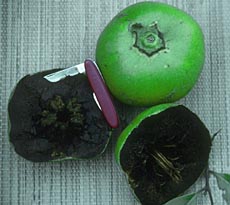 Black Sapote: The Chocolate Fruit
Black Sapote: The Chocolate Fruit
Name & Family
English: Black Sapote, Black Persimmon, Chocolate-Fruit, Chocolate Pudding Fruit
Spanish: Zapote Negro
German: Schwarze Sapote
Scientifical: Diospyros digyna, Family: Ebenaceae
Same family: Kaki - Mabolo - Japanese Persimmon
Type
Tropical Fruit, 2 to 10 seeded.
Seeds: shining dark red-brown colored.
Many trees bear pitless fruit.
Mexican relative to the Chinese persimmon.
Description, Taste & storage
The Black Sapote is a Tomato-like fruit, 10 x 13 cm. large berry with a thin and firm rind. Its color is shining dark green with brown specs. The fruitflesh is rich, dark brown colored and custard like and is therefore called the Chocolate pudding fruit.
Complete ripe fruits are often ugly brown.
Black sapote's flesh is rich and custard-like, with a sweet, nut-like mild flavor and when ripe fruit pulp is blended with milk, cream or ice-cream, it tastes like mild chocolate - but without the caffeine or calories!
Tree
The black sapote is native in Mexico and Guatemala.
It is cultivated in Florida, The Philippines, the Dominican Republic, Cuba and Hawaii.
It is an evergreen tree and grows upto 8 meter or more.
Black Sapote Tree Picture
Use
Often icecream is made of Black Sapotes.
The raw fruit is eaten with a spoon or eaten as dessert in milk or citrus juice.
Many different drinks are made from it as well as liquor.
Unripe fruits are not edible.
Use them in dips or sliced for a healthy chocolate-like dessert.
The white European Death Cult
6 years ago














2 comments:
sapote negro, sapote prieto, tliltic zapotl, tliltzapotl (nahuatl.) nouns ending in -ote or -ate (e.g. chocolol-ate) are normally linguistic adaptations of the absolutive suffix -tl. and because the l is kinda similar to maybe a silent glottal stop, then it ends up sounding vowel-like. this is seen is many parts of rural mexico, even in the north. This means that there is a direct connection between the nasalized “s” and this –ote/-tl phenomenon! yay! (yeah nobody told me this, I figured it out myself) this ultimately branches out to other exciting linguistic phenomena!!! double yay!
word up. Another linguistic trail for those who have eyes to see.
Post a Comment